 An Open Letter to University Presidents
An Open Letter to University Presidents
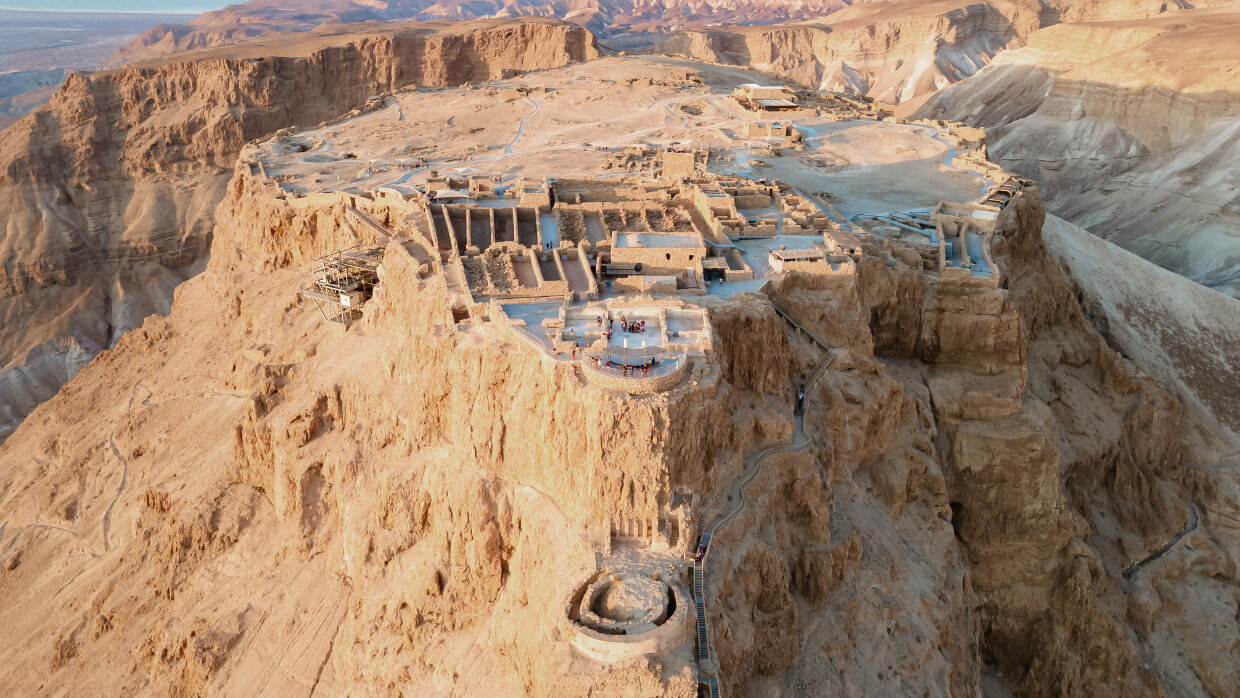

18 min read
The Jews on Masada faced a tragic dilemma: surrender and become slaves to the Romans, or commit suicide and deprive the Romans of their victory?
The Jews holed up in the mountain fortress of Masada fighting the might of the Roman legions faced a tragic dilemma. Should they surrender and become slaves and victims of the Romans, or should they commit suicide and deprive the Romans of their victory?
This question has been debated over the centuries and has been relevant for Jews throughout our history. Let’s analyze this controversial and emotionally wrenching question through the perspective of Jewish law and ethics.
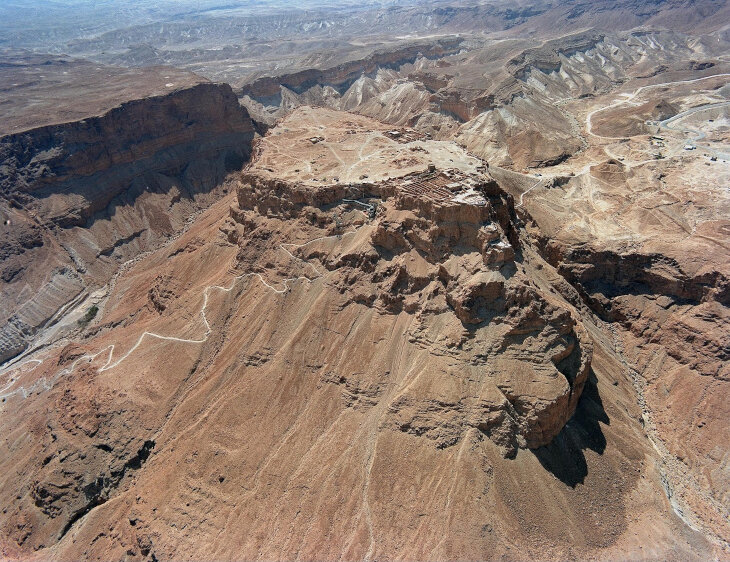 Aerial view showing Masada and the Snake Path from the northeast. Israel Government Press office.
Aerial view showing Masada and the Snake Path from the northeast. Israel Government Press office.
Masada is a fortress located on a plateau in the middle of the Judean desert and is one of Israel’s most popular tourist sites. The site was first excavated by the great Israeli archaeologist (and general) Yigal Yadin between 1963 and 1964.1 The extraordinary natural beauty and ruggedness of the area and the magnificent ruins of the fortress conceal a dramatic and horrifying story of heroism, desperation, and destruction.
After the Roman legions destroyed the Second Temple and defeated the Jewish commonwealth, some Jews continued fighting for independence. The most famous was the Bar Kochba revolt which began in 132 CE, but there were other pockets of resistance around Israel beforehand. One of these pockets was Masada where approximately 1000 people, the fighters, known as Sicarii2 or Zealots, and their families, entrenched themselves as a holdout against Roman rule.
The leader was Eliezer ben (son of) Yair and the year of the revolt was 73 CE, three years after the Temple’s destruction. Masada had plentiful supplies of food and massive cisterns to hold water, and its location was strategically ideal for a long siege. The Romans surrounded the fortress, built a huge military camp at the base of the mountain, and constructed a massive ramp to allow their troops and siege machines access to the walls of Masada. Ruins of the camp and the ramp can still be seen today at Masada, testimonies to the engineering skills of the Roman legions.3
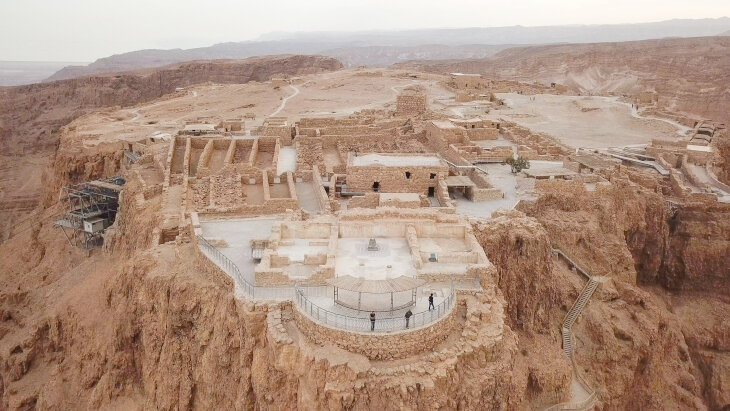
The story, as told by the Roman-Jewish historian Josephus Flavius, is that the leader of the Sicarii, Eliezer ben Yair, realized that it was only a matter of time before the Romans would breach the walls of Masada. He called his people together and gave an inspiring speech calling for the mass suicide of all on Masada, thus denying the Romans a victory. Although it is unclear how Josephus knew the details,4 he nevertheless “transcribes” the speech of Eliezer.
Since we, long ago, my generous friends, resolved never to be servants to the Romans, nor to any other than to God himself, who alone is the true and just Lord of mankind, the time is now come that obliges us to make that resolution true in practice...
We were the very first that revolted from them, and we are the last that fight against them; and I cannot but esteem it as a favor that God hath granted us, that it is still in our power to die bravely, and in a state of freedom, which hath not been the case of others, who were conquered unexpectedly. It is very plain that we shall be taken within a day's time; but it is still an eligible thing to die after a glorious manner, together with our dearest friends. This is what our enemies themselves cannot by any means hinder, although they be very desirous to take us alive….
Let our wives die before they are abused, and our children before they have tasted of slavery; and after we have slain them, let us bestow that glorious benefit upon one another mutually, and preserve ourselves in freedom, as an excellent funeral monument for us.5
There is some circumstantial (and hotly disputed) evidence for the suicide pact that the Zealots took. Yadin found hundreds of clay ostraca (shards of pottery) inscribed with Hebrew names, with various symbols next to the names. There is conjecture that these were the lotteries used to decide who would kill others, who would be killed and who would remain to commit suicide.6
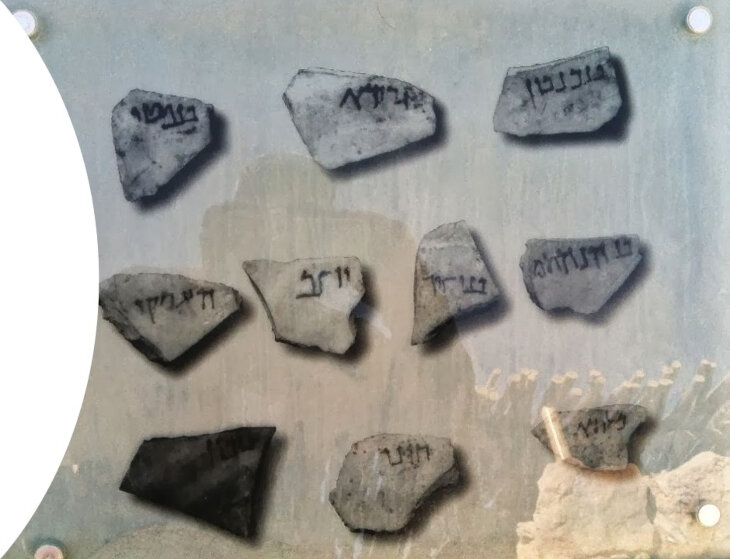 Hundreds of inscribed pottery shards [ostraca] were found. Outstanding among them was a group consisting of names and nicknames, including the name ‘Ben Ya’ir.’
Hundreds of inscribed pottery shards [ostraca] were found. Outstanding among them was a group consisting of names and nicknames, including the name ‘Ben Ya’ir.’
In modern Israeli culture the actions of the Zealots have been held up as heroic and courageous. Masada was chosen as one of the places where soldiers receive their berets and are sworn-in at the end of basic training. The slogan, “Masada shall not fall a second time” is an unofficial slogan of the IDF7 and the story of the Zealots has been memorialized by books, movies, and songs.
In contrast, the Mishnah,8 the basic text of Jewish law, was written in Israel about 100 years after the Masada siege and yet never mentions Masada. The Jerusalem Talmud9 and the Babylonian Talmud10 both contain extensive discussions about the destruction of the Temple, the war with the Romans and the Bar Kochba revolt yet are completely silent about Masada.
In an article focusing on this absence, Dr. Bernard Heller writes, “The total absence in the Talmud of any reference to the heroism of defenders of the Masada fortress is baffling. Their bravery against the onslaught of the enemy, and their determination not to fall captive to the Romans should have elicited praise paralleling at least those evoked by the victims of Bethar (Jerusalem Talmud Taanit Ch. 4, Babylonian Talmud Gittin 57-58). Instead, we witness a veritable blackout of the episode in the whole range of Talmudic and Midrashic lore”11
Dr. Heller suggests that the Talmudic silence was either a protest against the violence and extremism of the Sicarii; or it was disapproval of the mass suicide (and murders) that were in transgression of Jewish law.12
Another possibility is that the Sages of the Talmud were not aware of the precise details of the story, the only source being the questionable non-eyewitness “testimony” of Josephus. Not knowing the motivation or circumstances of the suicide, possibly not even sure that it happened, the Sages were not willing to discuss an issue that they could neither approve nor criticize. However, Dr. Shubert Spero, a professor of Jewish Thought at Bar Ilan University, does not see any significance to the absence of Masada from the Talmud, and indeed does not find it “baffling” at all, since, as he writes, “the Talmud is not a systematic chronicle of historical events.”13
Jewish scholars, ethicists and historians debate whether the actions of the Zealots were justified, allowed, obligated or prohibited by Jewish law. Many are familiar with the Jewish idea of suicide as anathema and a grievous sin. The text in Genesis14 “And your blood I will require from your soul” is understood by the Talmud as an injunction against suicide. As the Talmud states, “… it is forbidden for a person to wound himself... “And your blood I will require from your soul.” Rabbi Elazar explained, “From your souls I will require your own blood.”15
Are there any circumstances in which Jewish law would condone suicide? There are three sins for which a Jew must be prepared to die rather than transgress – murder, idolatry and sexual immorality.16 However, those are cases of allowing oneself to be killed by the oppressor or enemy, not actually committing suicide. In fact, one is obligated to preserve life and, in general, it is prohibited to commit martyrdom when not prescribed by law.17
Jewish legal texts draw on a famous case of suicide in the Book of Samuel, in which King Saul was at war with the Philistines. The Biblical text relates that Saul was on Mount Gilboa, and badly wounded by enemy archers,
And the Philistines fought against Israel; and the men of Israel fled from before the Philistines and fell down killed in Mount Gilboa. And the Philistines followed closely upon Saul and upon his sons; and the Philistines slew Jonathan, and Abinadab, and Melchishua, Saul’s sons. And the battle went hard against Saul, and the archers hit him; and he was badly wounded by the archers. Then said Saul to his armor bearer, Draw your sword, and thrust me through with it; lest these uncircumcised come and thrust me through, and abuse me. But his armor bearer would not; for he was terrified. Therefore, Saul took a sword, and fell upon it. And when his armor bearer saw that Saul was dead, he fell likewise upon his sword, and died with him. So, Saul died, and his three sons, and his armor bearer, and all his men, that same day together.18
Not only is King Saul not criticized for committing suicide, but the Jewish people are criticized for not eulogizing him appropriately,19 and a Midrashic source maintains that the verse prohibiting suicide does not include a case like King Saul.20
The factors that are used to justify King Saul’s suicide may be relevant to Masada. There are three major views:
As is evidenced from Eliezer’s speech, if we accept Josephus’ version, he was concerned that the Romans would make an example of them, torture and abuse the fighters, their wives and children, and thus create a “desecration of God’s name.” The Zealots also knew that the end was approaching, they could see the steady approach of the ramp, with the Roman legions and their war machines, and knew that they would not only be killed, but would likely be tortured to death. So, at least two of the concepts applied to King Saul would be relevant to Masada.
Another idea is mentioned to justify the Masada suicides, which unfortunately has many precedents in Jewish history. Many authorities maintain that not only should one be prepared to die to avoid one of the three cardinal sins, but, if one suspects that the enemy will use torture to force a transgression, one may, indeed some maintain one should, commit suicide to avoid that eventuality. Torture is considered a far greater challenge than martyrdom, and even one who is prepared to die for a cause, may not withstand the test of torture.24
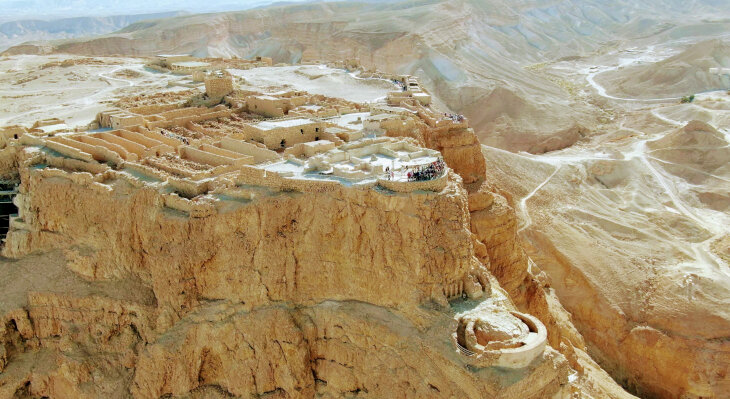
One of the calculations made by Eliezer was to “Let our wives die before they are abused, and our children before they have tasted of slavery.” He may have had in mind that under torture and duress the women and children, and probably also the fighters would be forced to contravene the most heinous sins in Judaism.
A tragic precedent to this can be found in the Talmud which recounts the following story from the time of the Roman destruction of the Temple:
There was an incident involving four hundred boys and girls who were taken as captives for the purpose of prostitution. These children sensed on their own what they were expected to do, and they said: If we commit suicide and drown in the sea, will we come to eternal life in the World-to-Come? The oldest child among them expounded the verse: “The Lord said,…. I will bring them back from the depths of the sea” (Psalms 68:23)… When the girls heard this, they all leapt and fell into the sea. The boys then drew an a fortiori inference with regard to themselves… and they too leapt into the sea.25
The commentaries point out that the boys and girls realized that they would probably be tortured into submission and hence were allowed, and possibly obligated to commit suicide.26
If Eliezer and the Zealots suspected, with good reason, that the Romans would torture them to force them to commit acts of idolatry, sexual immorality and bloodshed, committing suicide to avoid this would be appropriate.
Later in history at the time of the First Crusade (late 11th, early 12th century CE) many Jews in the Rhineland region were murdered by the Crusaders and many were tortured until they submitted to baptism. In both Jewish and Crusader chronicles the record shows that many Jews committed suicide to avoid being tortured into committing apostasy.27 These acts were justified by numerous Medieval Jewish Rabbis at the time.28 This justification could certainly be applied to Masada, especially since they were among the last holdouts of rebellion against the Empire and could expect no mercy from the Roman Legions.
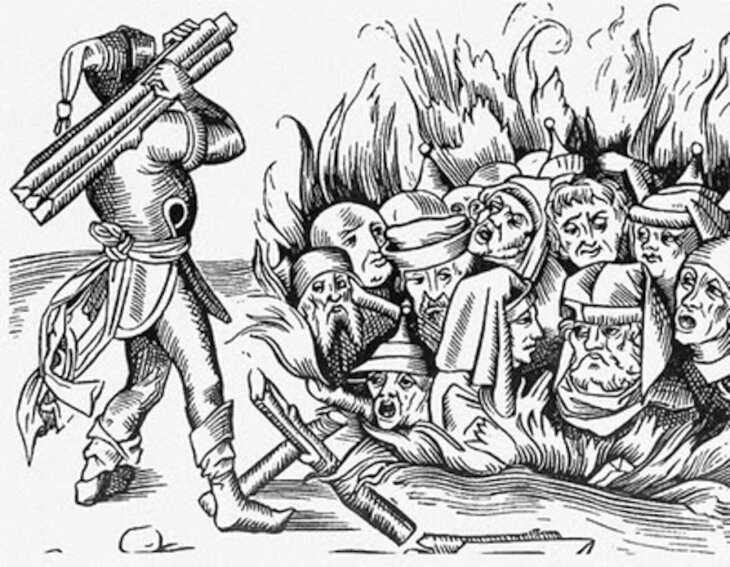 Jews being burnt to death during the First Crusade
Jews being burnt to death during the First Crusade
Regarding killing others, such as the wives and children of the Zealot warriors, this is a much more serious question. Suicide is one thing, and even killing oneself requires legal and ethical rationale from scripture and Jewish law. To kill another cannot be automatically inferred from the above sources. During the Crusades this indeed occurred and there is debate29 that continues to this day as whether such actions can ever be justified.30
Rabbi Shlomo Goren was the Chief Chaplain of the IDF, and later Chief Rabbi of Israel, and he officiated at the interment of the remains of the Masada martyrs. In a detailed legal analysis of the Masada suicide, he comes to the conclusion that the Zealots were justified by Jewish law and writes the following conclusions:
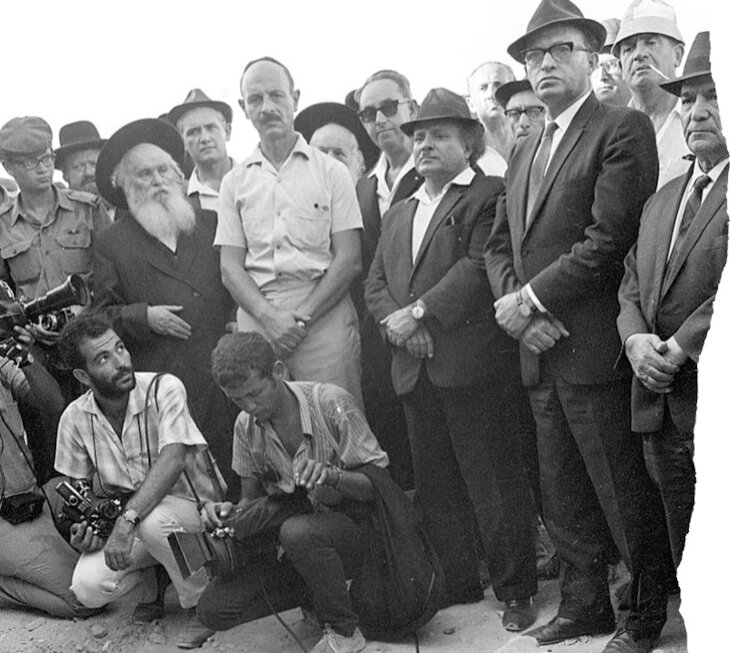 Funeral for the human remains unearthed at Masada, 1969
Funeral for the human remains unearthed at Masada, 1969
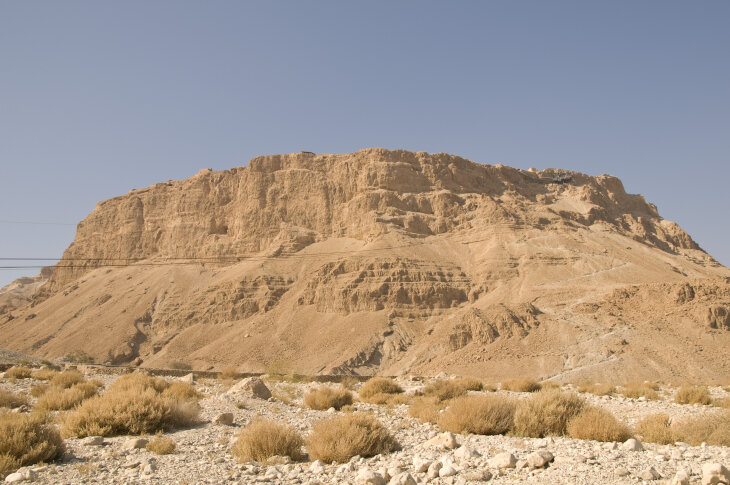
Precedent for a lenient view of suicide under duress is cited by Rabbi Goren from the words of the great Medieval Spanish sage, Nachmanides: “We also find great individuals who committed suicide under duress, such as King Saul of Israel who committed suicide. However, in his case, it was permissible for him to do so.”32 This idea is cited in the Code of Jewish Law as authoritative, and informs us not to judge harshly one who committed suicide under circumstances of duress, such as King Saul,33 and I would add, such as Masada.
It’s all too easy for us to sit here at our computers, with full stomachs, security and freedom to judge the actions of people under extreme, almost apocalyptic circumstances. However, I believe that we must look into the Masada story since its lessons have ramifications in Jewish law and ethics applicable to military and security situations today. It is incumbent upon us to examine these historical episodes without judging the participants, but with a critical eye to the ethical and legal aspects of the story.
The Jewish people have endured many Masadas, many Crusades and many persecutions. We have returned to the land of Israel and have once again climbed Masada, but we hope that Masada will remain just a tourist site, an archaeological wonder, and all its lessons theoretical.

The lack of any Talmudic reference is most likely due to the fact that the suicide pact at Masada was likely a fiction invented by Josephus. This does not detract from the analysis under Jewish law,